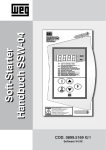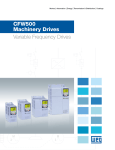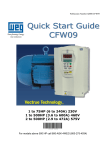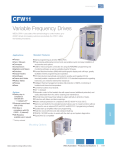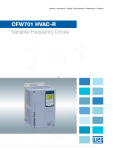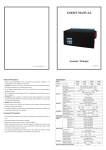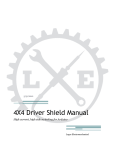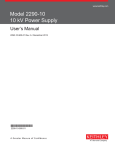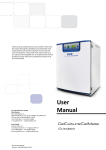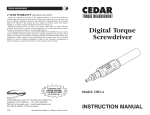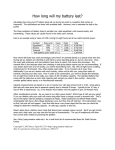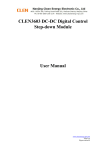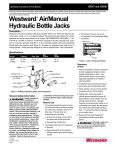Download Quick Start Guide SSW04
Transcript
Motors | Automation | Energy | Coatings Quick Start Guide SSW04 QS006SSW04 5 to 30HP (16 to 85A) 230V g 10 to 75HP (16 to 85A) 460V g 15 to 75HP (16 to 85A) 575V g Power Connections and Keypad Operation: Power Connections and Keypad Operation: The SSW04 Quick Start Guide is a supplement to help get the SSW04 started quickly using the most common installation and configuration options. This SSW04 Quick Start Guide is not meant to replace the SSW04 User’s Manual. For detailed instructions, safety precautions, proper mounting, installation, configuration, and operation please refer to the SSW04 User’s Guide. Warning: Only qualified personnel should plan or implement the installation, start-up, operation and maintenance of this equipment. Personnel must read the entire SSW04 User’s Guide before attempting to install, operate or troubleshoot the SSW04. Figure 1 - Power and Grounding Connections Key Start - Red LED LED Display – indicates fault codes, status, parameter number and value. Description Switches the display between parameter number and content. Increases Parameter number/content. Decreases Parameter number/content. Starts (Enables) the motor. Run - Red LED Stops (Disables) the motor, and resets the Soft Starter after a fault has occurred. Display rdy Pup EEP on oFF Figure 2 – Keypad Operation 2 Description Soft Starter is ready to be enabled Loading pump control parameters Loading “Default” values Function enabled Function disabled Basic Wiring: Basic Wiring: 1. Mount the SSW04 to a flat vertical surface. 2. Connect the three-phase incoming power leads to the R, S, and T connections on the power terminal and connect the GROUND lead to PE on the chassis (Refer to Figure 1). Connect the motor leads to the U, V, and W connections on the power terminal and connect the GROUND lead to PE on the chassis (Refer to Figure 1). Note: Only three-phase AC motors can be used. 3. Connect control power (110Vac) hot and neutral leads to pins 1 & 2 of the X1 connector respectively. 4. Apply Control Power followed by Input Power. The soft starter will run self-diagnostics and if no problems are found it will display “rdy” on the LED display. Minimum Parameters to Set: P21 – Motor Current Setting - Factory default position is “OFF” so there is no motor overload protection. To protect the motor from overload, obtain the full load amperage (FLA) off the motor and soft-starter name plates, and using the following formula, calculate the percentage of current that the motor will draw from the soft-starter. – – – – IN of the soft-starter = 170A IN of the motor = 140A IN of the motor / IN of the switch = 140A / 170A = 0.823 P21 = 82.3% P25 – Thermal Class of Overload Protection - Set to factory default of 30 if not specified on the motor name plate. P26 – Motor Service Factor – obtain from motor name plate. Notes: (1) To change the value of parameters set parameter P000=ON. (2) Soft Starters are shipped with factory default values. If parameters have been changed it is advisable to reset to factory default values prior to a new installation by setting P46=ON. (3) These are the minimum parameters for a perfect adaptation between soft starter and motor. For a complete description of Parameters and Error codes refer to Chapters 6 and 7 in the SSW04 User’s Guide. Keypad Start/Stop Operation (Local Mode): Action LED Display After power-up, the display shows the following message. Press Description Soft Starter powered-up. Motor begins to accelerate. Motor current (P72) = 200% “Start” When end of Acceleration ramp (P02) is reached the Motor Current (P72) = 100% Press By default, motor coasts to rest. For a decelerated stop, program P04 for desired deceleration time. “Stop” Soft Starter is turned off in “rdY” condition. Start/Run LED Symbols: 3 Start-up by Voltage Ramp 2 Wire Start/Stop (Remote Mode): Parameters: 1. Set P61=OFF to allow control from Digital Inputs instead of keypad. 2. By default DI1 is “2 Wire Start/Stop” and can not be changed directly. 3. Confirm P53, P54, and P55 are set to default values (Figure 3). Control Wiring: Verify there is a jumper between X2-3 and X2-5 or an external fault (E08) will occur. The jumper can be eliminated if DI3 is set to “No Function” (P54=OFF). Start/Stop switch is N.O. (normally open) and is connected as shown in Figure 3. Figure 3 – 2 Wire Start/Stop 3 Wire Start/Stop (Remote Mode): Parameters: 1. Set P61=OFF to allow control from Digital Inputs. 2. Set DI2 to “3 Wire Control” (P53=4). This sets DI2 as the “Stop” input and DI1 as the “Start” input. 3. Confirm P53, P54, and P55 are set to default values (Figure 4). Control Wiring: Verify there is a jumper between X2-3 and X2-5 or an external fault (E08) will occur. The jumper can be eliminated if DI3 is set to “No Function” (P54=OFF). “Start” and “Stop” are momentary push button switches and are connected as shown in Figure 4. “Start” is a N.O. (normally open) contact and “Stop” is a N.C. (normally closed) contact. Figure 4 - 3 Wire Start/Stop Remote Start/Stop Operation with Parameter Setup: Action LED Display After power-up, the display shows the following message. Soft Starter powered-up and ready to be programmed. Parameter mode is entered. Press Press Description Permits programming of parameters. and scroll to parameter P00. Parameter Value is displayed. Press 4 Setting P00=ON allows parameters to be programmed. Press Parameter value is stored. Press Press Parameter P61 determines whether commands are accepted through keypad/serial port or through the digital inputs. and scroll to parameter P61. Parameter Value is displayed. Press Setting Parameter P61 to “OFF” allows commands to be accepted through digital inputs instead of keypad/serial port. Press Parameter value is stored. Press Press Indicates percentage of output current. and scroll to parameter P72 Press Parameter Value is displayed. A. Close the Start/Stop switch at DI1 if 2 Wire Control. B. Push the Start switch at DI1 if 3 Wire Control. Motor starts and P72 indicates 200% output current at start up. After acceleration time (P02) has been reached P72 indicates 100% output current. A. Open Start/Stop switch at DI1 if 2 Wire Control. B. Push the Stop switch at DI2 if 3 Wire Control. Motor coast to rest if P04 is set to “OFF”. For a decelerated stop, program P04 for desired deceleration time. Soft Starter is turned off in “RDY” condition. Start/Run LED Symbols: Fault Codes: When a fault is detected, the soft starter is disabled and the Fault Code is displayed (example E03). To restart the soft starter after a fault has occurred, the soft starter must be reset. Resetting the soft starter can be done by disconnecting and reapplying AC power (power-on reset), by pressing the “O/RESET” key (manual reset), automatic reset, or via digital inputs. For details on Reset and a full list and description of Fault Codes please read Chapter 7 in the SSW04 User’s Guide. 5 Credit Limiting for Loads with High or Constant Starting Torque Current Limiting for Loads with High or Constant Starting Torque: P11 – Current Limiting During Starting • • • P11 sets the maximum current value that will be supplied to the motor (load) during acceleration. The current limitation is used for loads with high or constant starting torque. The current limitation must be set at a level that permits the motor to accelerate otherwise the motor will not start. P11- Calculation example for limiting the current to 2.5 x IN of the motor: – – IN of the switch = 60A IN of the motor = 52A – – ILIM = 250% of the IN of the motor 2.5x 52A =130A – 130A / IN of the switch = 130A / 60A = 2.17 x IN of the switch – P11 = 217% of the IN of the switch = 2.5x IN of the motor Notes: (1) If the full voltage is not reached at the end of the acceleration ramp time (P02), the error E02 will be displayed and the motor will be disabled. (2) Current Limiting is not active when the Voltage/Kick pulse (P41) is enabled during start. (3) Please refer to Chapter 6 in the SSW04 User’s Guide for detailed information on Current Limiting during starting. 6 Soft Starters SSW04 Technical Data Power Supply Enclosure Control Starting Duty Cycle (10 Starts / Hr) Inputs Outputs Voltage Frequency Control Voltage Metallic Cabinet Color Method Power Supply CPU Communication Safety Digital Relay Analog Serial Interface Protections Functions / Features Standard Model D: 220 / 230 / 240 / 380 / 400 / 415 / 440 V ( + 10 % , - 15 % ) Model G: 460 / 480 / 575 V ( + 10 % , - 15 % ) 50 / 60 Hz +/- 5 Hz ( 45 ... 65 Hz ) 115VAC IP 20 Cover: Opaque Gray, Cabinet: Opaque Blue Motor Voltage Variation Switched Mode Power Supply 16 Bit Microprocessor 300 % ( 3 x Rated Current ) for 20 sec (10 Starts/hour) 4 x 24vDC Programmable Isolated Inputs 2 programmable Outputs: 250 V / 1 A Form A Contact (NO) 1 Output ( Reversing (NO + NC ) : 250 V / 1 A – Fault Indication RS-232 Power supply phase loss Motor Phase Loss Motor Overload - i2t External Fault Phase Sequence Motor Immediate Under Current Thyristor Fault Serial Communication Error Built-in Operator Interface ( keypad ) Detachable – 7 Segment LED Display Programming Enabling Password Fault Auto-Diagnosis PUMP CONTROL Feature ( Water Hammer Protection for Pumps ) ENERGY SAVING Feature BY-PASS Relay FWD / REV Feature via Digital Input ( Needs External Contactor) RS-232 Serial Interface Motor PTC thermistor input Programmable Pedestal Voltage Programmable Acceleration Ramp Programmable Deceleration Ramp Programmable Step Down Voltage for Deceleration Programmable Starting Current Limit Programmable Immediate Motor Over Current Level Programmable Immediate Over Current Time Programmable Immediate Motor Under Current Level Programmable Immediate Under Current Time Kick Start DC Braking ( DC Current Injection ) Optional Operator Interface (Keypad) Programming / Commands Display Readings Ambient Temperature Humidity Altitude Finishing Conformities Certifications Color Safety Low Voltage EMC UL(USA)/cUL(Canada) CE ( Europe ) Programmable Motor Overload Protection JOG Function Programmable Fault Auto Reset Programmable Motor Thermal Memory Auto-Reset Motor Thermal Overload Protection Class Motor Service Factor Programmable Line Voltage Remote Operator Interface ( LED’s ) Programming Error Motor locked rotor CPU Error (Watchdog) Motor Immediate Over Current Motor Over Temperature (via Thermistor input) Self Diagnosis Error Thyristor’s / Heatsink Over Temperature 25 … 90% of Rated Voltage 1 ... 240 seconds OFF, 2 ... 240 seconds 100 ... 40 % of Rated Voltage OFF, 150 ... 500 % of Rated Current 105 ... 200 % of Rated Current OFF, 1 ... 20 seconds 25 ... 95 % of Rated Current OFF, 1 ... 30 seconds Level : 70 ... 90 % of Rated Voltage Duration: 0.1 ... 2 seconds Level : 30 ... 50 % of Rated Voltage Duration: 1 ... 10 seconds OFF, 50 ... 120 % of Rated Current 25 ... 50 % of Rated Voltage OFF, 10 ... 600 seconds OFF, 1 ... 600 seconds 5, 10, 15, 20, 25 and 30 0.80 ... 1.50 220 ... 440 V and 460 ... 575 V Start, Stop / Reset and Programming Increment and Decrement Parameters Content Output Current ( Motor ) – [ A ] Output Voltage – [ 0...100 % Rated Voltage ] Output Current ( Motor ) – [ % of Rated ] Motor Output Factor – [ 0.00 ... 0.99 ] Load Active Power – [ kW ] 4 Last Faults Back-up Load Apparent Power – [ kVA ] Soft Starter Software Version Thermal Protection Status – [ 0 ... 250 % ] 0 ... 40 °C ( 32 ... 104 °F ) Standard Operation at Rated Current 40 ... 55 °C ( 104 ... 131 °F ) With Output Current Derating 0 ... 90 %, Non Condensing 0 ... 1000 m ( 3,300 ft ) Standard Operation at Rated Current Up to 4000 m ( 13,200 ft ) – With Current Derating (1%/100 m(328 ft) above 1000 m (13,200 ft) ) Cover: Light Grey RAL 7032 Cabinet: Dark Grey RAL 7022 UL 508 Standard – Industrial Control Equipment EN 60947-4-2 Standard ; LVD 73 / 23 / EEC – Low Voltage Directive EMC Directive 89 / 336 / EEC – Industrial Environment With Additional Filter Underwriters Laboratories Inc. – USA Certified by ITS – UK QS006SSW04 WEG Electric Corp. 1327 Northbrook Parkway, Suite 490 Suwanee, GA 30024 Phone: 1-800-ASK-4WEG web: www.weg.net








